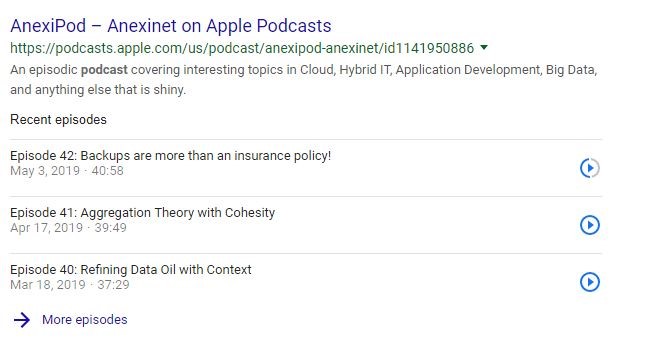How to Optimize Podcast Episodes for the Brand-New Google Podcast Indexing [4 Steps]


Fresh off the presses, Google announced at its May 2019 I/O developers conference that is was officially going to start indexing podcast episodes to appear in SERPs (search engine results pages).
Here's what's changing:
- Google will soon bring up "knowledge panels," which are a native Google page that offers media sources that a person can consume without ever leaving the search engine.
- Podcast episode content, not just the titles, will now be indexed in searches. Users will be able to play episodes directly in the Google knowledge panel, instead of Google linking out to other players like Apple Podcasts.

While we don't yet know if this is just an effort by Google to start ranking content they know your listeners find valuable--or if it's an attempt by the G Machine to get into the podcast platform game?--what we do know is that many people have historically not optimized their podcast content because they thought, "Who cares? It doesn't show up in traditional search anyway..."
What this could mean for you:
- If you have a library of podcast episodes using fun titles (but not SEO-optimized ones), you're missing out on a key opportunity to revisit and reoptimize them.
- If you are not taking advantage of the transcript feature of your player, your podcast may not be indexed moving forward in search.
- The content in your conversations will matter now more than ever. If you have a lot of "fluff" episodes that, for some reason, don't provide valuable conversations around crucial topics for your audience, you likely will not benefit from the new indexing.
We will soon be able to see exactly how these new Google podcast indexing changes are affecting marketing pieces' rankings, so these are (as with anything shrouded in Google-update-mystery), educated guesses.
The time has come to apply SEO best practices to podcast episodes to give another helping hand to your traffic numbers and your content visibility.
Here are 4 steps you can take to optimize podcast episodes for the brand-new Google podcast indexing update:
1. Dedicate resources for transcription, optimization, and future research.
- Don't make this a half-assed effort to keep up with the Joneses. If you have even a dozen podcast episodes, this will likely take a few hours per post for keyword research, transcription (or transcription review if you're using a tool like Happy Scribe), re-submitting to your podcast platforms, and keeping up with future recommendations and lessons learned in the coming months.
- If you have episodes that are sub-par audio quality, don't have any unique audio elements like a theme intro song, or are generally not up-to-snuff with your brand's ideal quality, now is the time to give them the axe (or re-record them).
Just like we saw with Google's changes in the last 5 years to favor content quality and linking intent over quantity, we can safely assume the same principal will apply to this new era of search results.
2. Audit your existing podcast library and see where you rank now.
- Familiarize yourself by doing Google searches for your podcast name in incognito on different IP addresses than your own (not a perfect system, but hopefully a bit less skewed than it could be).
- See how your show will appear in the knowledge panels, get to know your users' experiences, and then start searching for the topics you have episodes on.
- For example, if you have an episode on how to speak with dolphins in Morse code, try searching "speak with dolphins podcast," just like a perfectly normal human who's learning to speak with dolphins might do.
- Does your episode appear?
- If not, do other brands' episodes appear? What do their results look like, and how does their content differ?
- For example, if you have an episode on how to speak with dolphins in Morse code, try searching "speak with dolphins podcast," just like a perfectly normal human who's learning to speak with dolphins might do.
3. Game-plan for your keyword strategy to re-optimize episodes.
- Just like you would create a search strategy for any other type of marketing content, perform SEO analysis and keyword research for each of your episodes to understand your target and supporting terms.
- This is also a great time to revisit your title strategy and how you optimize for clicks, downloads, name recognition, and showing immediate value to your potential listener. How do you answer the question, "What's in it for me?" in the 3 seconds they take to read your title when it shows up in search or when they come across it in a platform?
- Make sure to absorb other great SEO podcast best practices from names like Jake Ballinger, whose "definitive" guide dives far deeper into specific optimization tactics than we're going to get into today.
4. Transcribe your episodes to take full advantage of indexable content in an episode.
- Now that we're in the reality of AI transcriptions of your episodes into text files, you need to make sure that any complementary transcriptions you have in your episode descriptions are complete, accurate, and optimized.
- When you can, make sure to include headers, easy-to-skim formatting, links to next-step content where relevant, and videos or visuals that help tell your story.
Prioritize Your Digital Experience for Every Visitor
I hope the updates and ideas here are actionable and helpful as you prepare your digital strategy to adapt to this indexing change. If you feel like you're stretched on bandwidth or struggling to keep up with the whirlwind of the digital marketing industry, we're here to help.
